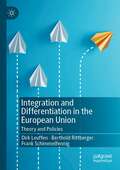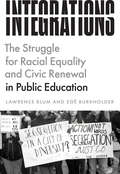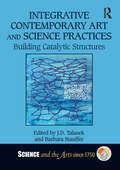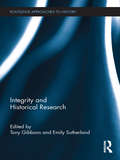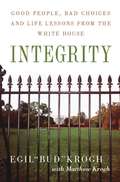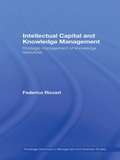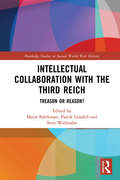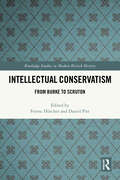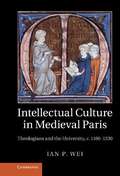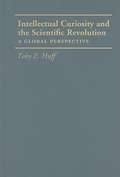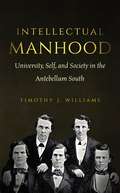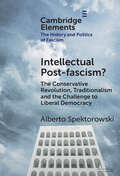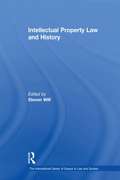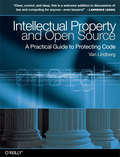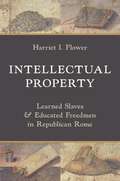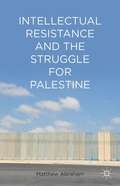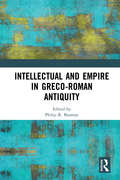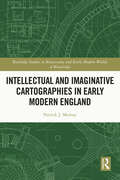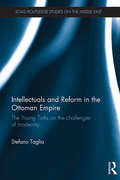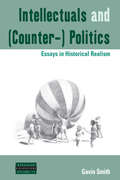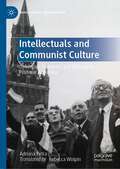- Table View
- List View
Integration and Differentiation in the European Union: Theory and Policies
by Frank Schimmelfennig Dirk Leuffen Berthold RittbergerFar from displaying a uniform pattern, European integration varies significantly across policy areas and individual countries. Why do some member states choose to opt out of specific EU policies? Why are some policies deeply integrated whereas others remain intergovernmental? In this updated second edition, the authors introduce the most important theoretical approaches to European integration and apply these to the trajectories of key EU policy areas. Arguing that no single theory offers a completely convincing explanation of integration and differentiation in the EU, this thought-provoking book provides a new synthesis of integration theory and an original way of thinking about what the EU is and how it works.
Integration and Peace in East Africa: A History of the Oromo Nation
by Tsega EtefaThis book analyzes the development of indigenous religious, commercial, and political institutions among the Oromo mainly during the relatively peaceful two centuries in its history, from 1704 to 1882. The largest ethnic group in East Africa, the Oromo promoted peace, cultural assimilation, and ethnic integration.
Integrations: The Struggle for Racial Equality and Civic Renewal in Public Education (History and Philosophy of Education Series)
by Lawrence Blum Zoë BurkholderThe promise of a free, high-quality public education is supposed to guarantee every child a shot at the American dream. But our widely segregated schools mean that many children of color do not have access to educational opportunities equal to those of their white peers. In Integrations, historian Zoë Burkholder and philosopher Lawrence Blum investigate what this country’s long history of school segregation means for achieving just and equitable educational opportunities in the United States. Integrations focuses on multiple marginalized groups in American schooling: African Americans, Native Americans, Latinxs, and Asian Americans. The authors show that in order to grapple with integration in a meaningful way, we must think of integration in the plural, both in its multiple histories and in the many possible definitions of and courses of action for integration. Ultimately, the authors show, integration cannot guarantee educational equality and justice, but it is an essential component of civic education that prepares students for life in our multiracial democracy.
Integrations: The Struggle for Racial Equality and Civic Renewal in Public Education (History and Philosophy of Education Series)
by Lawrence Blum Zoë BurkholderThe promise of a free, high-quality public education is supposed to guarantee every child a shot at the American dream. But our widely segregated schools mean that many children of color do not have access to educational opportunities equal to those of their white peers. In Integrations, historian Zoë Burkholder and philosopher Lawrence Blum investigate what this country’s long history of school segregation means for achieving just and equitable educational opportunities in the United States. Integrations focuses on multiple marginalized groups in American schooling: African Americans, Native Americans, Latinxs, and Asian Americans. The authors show that in order to grapple with integration in a meaningful way, we must think of integration in the plural, both in its multiple histories and in the many possible definitions of and courses of action for integration. Ultimately, the authors show, integration cannot guarantee educational equality and justice, but it is an essential component of civic education that prepares students for life in our multiracial democracy.
Integrations: The Struggle for Racial Equality and Civic Renewal in Public Education (History and Philosophy of Education Series)
by Lawrence Blum Zoë BurkholderThe promise of a free, high-quality public education is supposed to guarantee every child a shot at the American dream. But our widely segregated schools mean that many children of color do not have access to educational opportunities equal to those of their white peers. In Integrations, historian Zoë Burkholder and philosopher Lawrence Blum investigate what this country’s long history of school segregation means for achieving just and equitable educational opportunities in the United States. Integrations focuses on multiple marginalized groups in American schooling: African Americans, Native Americans, Latinxs, and Asian Americans. The authors show that in order to grapple with integration in a meaningful way, we must think of integration in the plural, both in its multiple histories and in the many possible definitions of and courses of action for integration. Ultimately, the authors show, integration cannot guarantee educational equality and justice, but it is an essential component of civic education that prepares students for life in our multiracial democracy.
Integrative Contemporary Art and Science Practices: Building Catalytic Structures (Science and the Arts since 1750)
by Barbara Stauffer J. D. TalasekContributors investigate the motivation behind scientifically-embedded contemporary art practices as well as art-based scientific research and engagement that attempt to shape society. This edited volume reflects the rapidly developing practices comprising integrative and collaborative work across different knowledge domains (including art and science), the benefit of those processes to the individual, to knowledge production (and its complexity) and ultimately the benefits to society (why it is worth doing). The book will provide an overview of the factors in which the exhibition and performance of scientifically-engaged art inside and outside of traditional museum spaces has instigated cultural and aesthetic transformations and social interactions while presenting a variety of opportunities for educators, scientists, artists and the interested public to critically expand its engagement. The book is intended for scholars interested in collaborative and/or integrative work who study research, methodology, art history, science, and museum studies.
Integrity and Historical Research (Routledge Approaches to History)
by Tony Gibbons Emily SutherlandThere have been serious debates between historians, novelists and filmmakers as to how best present historical narratives. When writers and filmmakers talk of using historical research with integrity, what exactly do they mean? Integrity and Historical Research examines this question in detail. The first chapter discusses the concept of integrity. The chapters that follow reflect on this philosophical treatment in the light of fiction and film that deals with history in a number of ways. How should writers and filmmakers use lives? Can, and may, people who are now dead and who may have lived long ago, be defamed? The authors include academics, historians, social historians, medievalists, oral historians, literary theorists, historical novelists and script writers. They examine the theoretical influences and practical choices that involve and concern writers and filmmakers who rely on historical research. The desire to be accurate may often conflict with the need to produce a work that goes beyond the mere depiction of events in order to excite the interest of readers and to hold that interest. At the same time there is a developing emphasis on historians, to write well in clear, accessible prose, which may involve using the novelists’ techniques. How much license may be given to writers of fiction and filmmakers in their depiction of historical characters and events? This book begins to answer this question, while inviting further discussion.
Integrity: Good People, Bad Choices, and Life Lessons from the White House
by Egil Bud" Krogh Matthew KroghIn 1971, Egil "Bud" Krogh was summoned to a closed-door meeting by John Ehrlichman, his mentor and key confidant of President Richard Nixon, in a secluded office in the Western White House. Krogh thought he was walking into a meeting to discuss the drug control program launched on his most recent trip to South Vietnam. Instead, he was handed a file and the responsibility for the SIU, Special Investigations Unit, later to become notorious as "The Plumbers. " The unit was to investigate the leaks of top-secret government documents, particularly the Pentagon Papers, to the press. The president considered this task critical to national security. Nixon said he wanted the unit headed up by a "real son of a bitch. " He got the studious, zealous, and loyal-to-a-fault Bud Krogh instead. In that instant, Krogh was handed the job that would lead to one of the most famous conspiracies in presidential history and the demise of the Nixon administration. Integrity is Krogh's memoir of his experiences-of what really went on behind closed doors, of how a good man can lose his moral compass, of how exercising power without integrity can destroy a life. It also tells the moving story of how he turned his life back around. For anyone interested in the ethical challenges of leadership, or of professional life, Integrity is thought-provoking and inspiring reading.
Intellectual Capital and Knowledge Management: Strategic Management of Knowledge Resources (Routledge Advances In Management And Business Studies)
by Federica RicceriIt is widely held that the successful management of knowledge resources within industry creates value. However, how this value is created is less clear. This book explores the management of knowledge resources in organisations. Several of the frameworks which have been created around the world to manage knowledge resources are examined and the book
Intellectual Collaboration with the Third Reich: Treason or Reason? (Routledge Studies in Second World War History)
by Maria Björkman Patrik Lundell Sven WidmalmThe book investigates the rather neglected "intellectual" collaboration between National Socialist Germany and other countries, including views on knowledge and politics among "pro-German" intellectuals, using a comparative approach. These moves were shaped by the Nazi system, which viewed scientific and cultural exchange as part and parcel of their cultural propaganda and policy. Positive views of the Hitler regime among intellectuals of all sorts were indicative of a broader discontent with democracy that, among other things, represented an alternative approach to modernization which was not limited to the German heartlands. This book draws together international experts in an analysis of right-wing Europe under Hitler; a study which has gained new resonance amidst the wave of European nationalism in the twenty-first century.
Intellectual Conservatism: From Burke to Scruton (Routledge Studies in Modern British History)
by Ferenc Hörcher Daniel Pitt Kálmán TóthThis book examines the history of intellectual conservatism from its late 18th century "founding father", Edmund Burke, to its last great representative, the late Sir Roger Scruton.Focusing on British intellectual conservatism and investigating this under-researched area of political thought through multiple contributions and disciplines, the editors' aim is to provide an account of the supportive or critical intellectual work behind conservative politics in the 19th and 20th century, with a long-term view on the modern conservative movement. It is an up-to-date account of some of the major theoretical issues of conservatism that utilises case studies to provide pictures of particular conservative intellectuals, explain key concepts and reconstruct major schools and defining debates within conservatism. There is a particular focus on the role of Christianity, the British common law tradition and on the connection between culture and politics.Intellectual Conservatism: From Burke to Scruton is valuable for university students studying history, political science, PPE or the social sciences, as well as those interested in the contemporary debates in Western politics on the future of Europe and the US.
Intellectual Culture in Medieval Paris
by Ian P. WeiIn the thirteenth century, the University of Paris emerged as a complex community with a distinctive role in society. This book explores the relationship between contexts of learning and the ways of knowing developed within them, focusing on twelfth-century schools and monasteries, as well as the university. By investigating their views on money, marriage and sex, Ian Wei reveals the complexity of what theologians had to say about the world around them. He analyses the theologians' sense of responsibility to the rest of society and the means by which they tried to communicate and assert their authority. In the late thirteenth and early fourteenth centuries, however, their claims to authority were challenged by learned and intellectually sophisticated women and men who were active outside as well as inside the university and who used the vernacular – an important phenomenon in the development of the intellectual culture of medieval Europe.
Intellectual Curiosity and the Scientific Revolution
by Toby E. HuffSeventeenth-century Europe witnessed an extraordinary flowering of discoveries and innovations. This study, beginning with the Dutch-invented telescope of 1608, casts Galileo's discoveries into a global framework. Although the telescope was soon transmitted to China, Mughal India, and the Ottoman Empire, those civilizations did not respond as Europeans did to the new instrument. In Europe, there was an extraordinary burst of innovations in microscopy, human anatomy, optics, pneumatics, electrical studies, and the science of mechanics. Nearly all of those aided the emergence of Newton's revolutionary grand synthesis, which unified terrestrial and celestial physics under the law of universal gravitation. That achievement had immense implications for all aspects of modern science, technology, and economic development. The economic implications are set out in the concluding epilogue. All these unique developments suggest why the West experienced a singular scientific and economic ascendancy of at least four centuries.
Intellectual Manhood
by Timothy J. WilliamsIn this in-depth and detailed history, Timothy J. Williams reveals that antebellum southern higher education did more than train future secessionists and proslavery ideologues. It also fostered a growing world of intellectualism flexible enough to marry the era's middle-class value system to the honor-bound worldview of the southern gentry. By focusing on the students' perspective and drawing from a rich trove of their letters, diaries, essays, speeches, and memoirs, Williams narrates the under examined story of education and manhood at the University of North Carolina, the nation's first public university.Every aspect of student life is considered, from the formal classroom and the vibrant curriculum of private literary societies to students' personal relationships with each other, their families, young women, and college slaves. In each of these areas, Williams sheds new light on the cultural and intellectual history of young southern men, and in the process dispels commonly held misunderstandings of southern history. Williams's fresh perspective reveals that students of this era produced a distinctly southern form of intellectual masculinity and maturity that laid the foundation for the formulation of the post-Civil War South.
Intellectual Networks in Timurid Iran: Sharaf al-Dīn ʿAlī Yazdī and the Islamicate Republic of Letters (Cambridge Studies in Islamic Civilization)
by İlker Evrim BinbaşBy focusing on the works and intellectual network of the Timurid historian Sharaf al Dīn ʿAlī Yazdī (d. 1454), this book presents a holistic view of intellectual life in fifteenth-century Iran. İlker Evrim Binbaş argues that the intellectuals in this period developed informal networks which transcended political and linguistic boundaries, and spanned an area from the western fringes of the Ottoman state to bustling late medieval metropolises such as Cairo, Shiraz, and Samarkand. Among many others, the network included an Ottoman revolutionary, a Mamluk prophet, a Timurid occultist, as well as physicians, astronomers, devotees of the secret sciences, and those political figures who believed that the network was a force to be taken seriously. Also discussing the formation of an early modern Islamicate republic of letters, this book offers fresh insights into the study of intellectual history beyond the limitations imposed by nationalist methodologies, established genres, and recognized literary traditions.
Intellectual Post-fascism?: The Conservative Revolution, Traditionalism and the Challenge to Liberal Democracy (Elements in the History and Politics of Fascism)
by Alberto SpektorowskiIs the world facing creeping fascism? And if so, how is it configured in contemporary circumstances? A wide-ranging debate has developed in recent years among scholars increasingly worried by the weakness of liberal democracy, and the growing electoral power of national populist movements in Europe. In this account, the rise of the current wave of populism was preceded, and is now accompanied by an important theoretical elaboration, initiated in the 1970's in France by the intellectuals of the Nouvelle Droite and continued by Russian, American and Latin-American intellectuals and political strategists. The theoretical goals of this meta-political elaboration is a reformulation of the values of cultural diversity, identity politics, and post-colonialism, a process which in this Element the author defines as the attempt to decolonize the 'postcolonial Western mind'.
Intellectual Property Law and History (The\international Library Of Essays In Law And Society Ser.)
by Steven WilfIntellectual property has become a dominant feature of our knowledge based economy in recent years, but how has property rights in intangible items developed? This book brings together for the first time exemplary scholarship with diverse approaches to the history of United States intellectual property protection, including trade secrets, trademark, copyright, and patent law. These articles, written by leading experts in the field and often challenging conventional narratives, underscore the importance of historical perspectives for understanding how an extensive, evolving framework for the regulation of knowledge emerged in the modern period. By tracing intellectual property from an historical perspective - not merely providing justifications in philosophy or economics in the abstract - this book draws upon the past to address contemporary debates over such varied topics as: access to knowledge; policing copyright infringement; whether employees should own the products of their minds; the role of national borders in an age of digital information; and the very future of intellectual property as stakeholders and consumers contest the extent of its legal protection.
Intellectual Property and Open Source: A Practical Guide to Protecting Code
by Van Lindberg"Clear, correct, and deep, this is a welcome addition to discussions of law and computing for anyone -- even lawyers!"-- Lawrence Lessig, Professor of Law at Stanford Law School and founder of the Stanford Center for Internet and SocietyIf you work in information technology, intellectual property is central to your job -- but dealing with the complexities of the legal system can be mind-boggling. This book is for anyone who wants to understand how the legal system deals with intellectual property rights for code and other content. You'll get a clear look at intellectual property issues from a developer's point of view, including practical advice about situations you're likely to encounter.Written by an intellectual property attorney who is also a programmer, Intellectual Property and Open Source helps you understand patents, copyrights, trademarks, trade secrets, and licenses, with special focus on the issues surrounding open source development and the GPL. This book answers questions such as:How do open source and intellectual property work together?What are the most important intellectual property-related issues when starting a business or open source project?How should you handle copyright, licensing and other issues when accepting a patch from another developer?How can you pursue your own ideas while working for someone else?What parts of a patent should be reviewed to see if it applies to your work?When is your idea a trade secret?How can you reverse engineer a product without getting into trouble?What should you think about when choosing an open source license for your project?Most legal sources are too scattered, too arcane, and too hard to read. Intellectual Property and Open Source is a friendly, easy-to-follow overview of the law that programmers, system administrators, graphic designers, and many others will find essential.
Intellectual Property: Learned Slaves and Educated Freedmen in Republican Rome
by Harriet I. FlowerThe first in-depth account of the lives and careers of educated slaves and freedmen in ancient RomeSlaves and freedmen played an important yet understudied role in the literary culture of the Roman Republic. Though their work went largely uncredited, they fulfilled vital roles as editors, researchers, and collaborators in the service of Rome&’s literary and political elite. Intellectual Property tells the stories of these gifted and highly educated young men, from Licinius the flute-player, who shaped the rhetorical style of the orator Gaius Gracchus, to the grammarian and teacher Tyrannio of Amisus, who was brought to Rome as a war captive.Highlighting the unique social prestige of literary production and intellectual performance in a society pervaded by slave labor, Harriet Flower shows how the exorbitant prices paid for the highly educated encouraged a complex system of training young boys for the marketplace or acquiring educated captives as booty, and how they were treated as valuable assets to be deployed as prizes, gifts, or investments that could bestow financial and cultural capital. She demonstrates how enslaved and manumitted intellectuals, far from being menial workers, shared close relationships with leading Romans of the day. They came from a variety of backgrounds and were relied on as coauthors and collaborators in a range of genres, with some gaining fame as authors themselves.With lively case studies and insightful new interpretations of the ancient sources, Intellectual Property paints a more nuanced picture of enslaved labor in ancient Rome, revealing how the contributions of enslaved intellectuals were closely linked to the ambitious development of Latin literary culture and the dissemination of knowledge.
Intellectual Resistance and the Struggle for Palestine
by Matthew AbrahamIntellectual Resistance and the Struggle for Palestine.
Intellectual and Empire in Greco-Roman Antiquity
by Philip R. BosmanThis volume deals with the interaction between public intellectuals of the late Hellenistic and Roman era, and the powerful individuals with whom they came into contact. How did they negotiate power and its abuses? How did they manage to retain a critical distance from the people they depended upon for their liveli-hood, and even their very existence? These figures include a broad range of prose and poetry authors, dramatists, historians and biographers, philosophers, rhetoricians, religious and other figures of public status. The contributors to the volume consider how such individuals positioned themselves within existing power matrices, and what the approaches and mechanisms were by means of which they negotiated such matrices, whether in the form of opposition, compromise or advocacy. Apart from cutting-edge scholarship on the figures from antiquity investigated, the volume aims to address issues of pertinence in the current political climate, with its manipulation of popular media, and with the increasing interference in the affairs of institutions of higher learning funded from public coffers.
Intellectual and Imaginative Cartographies in Early Modern England (Routledge Studies in Renaissance and Early Modern Worlds of Knowledge)
by Patrick J. MurrayTaking as its focus an age of transformational development in cartographic history, namely the two centuries between Columbus’s arrival in the New World and the emergence of the Scientific Revolution, this study examines how maps were employed as physical and symbolic objects by thinkers, writers and artists. It surveys how early modern people used the map as an object, whether for enjoyment or political campaigning, colonial invasion or teaching in the classroom. Exploring a wide range of literature, from educational manifestoes to the plays of Marlowe and Shakespeare, it suggests that the early modern map was as diverse and various as the rich culture from which it emerged, and was imbued with a whole range of political, social, literary and personal impulses. Intellectual and Imaginative Cartographies in Early Modern England, 1550-1700 will appeal to all those interested in the History of Cartography.
Intellectuals and Reform in the Ottoman Empire: The Young Turks on the Challenges of Modernity (SOAS/Routledge Studies on the Middle East)
by Stefano TagliaThis book uncovers Young Turk political and social ideas at the end of the nineteenth century, during the intellectual phase of the movement. Analysing the life in exile of two of the most charismatic leaders of the Young Turk movement, Ahmed Rıza and Mehmet Sabahattin, the book unravels their plans for the future of the Ottoman Empire, covering issues of power, religion, citizenship, minority rights, the role of the West, and the accountability of the Sultan. The book follows Rıza and Sabahattin through their association with philosophical circles, and highlights how their emphasis on intellectualism and elitism had a twofold effect. On the one hand, seeing themselves as enlightened and entrusted with a mission, they engaged in enduring debates, leaving an important legacy for both Ottoman and Republican rule. On the other hand, the rigidity resulting from elitism and intellectualism prevented the conception of concrete plans for change, causing a schism at the 1902 Congress of Ottoman Liberals and marking the end of the intellectual phase. Using bilingual period journals, contemporary accounts, police archives and political and philosophical treaties, this book is of interest to students, scholars and researchers of Middle East and Ottoman History, and Political Science more broadly.
Intellectuals and (Counter-) Politics: Essays in Historical Realism
by Gavin SmithContemporary forms of capitalism and the state require close analytic attention to reveal the conditions of possibility for effective counter-politics. On the other hand the practice of collective politics needs to be studied through historical ethnography if we are to understand what might make people's actions effective. This book suggests a research agenda designed to maximize the political leverage of ordinary people faced with ever more remote states and technologies that make capitalism increasingly rapacious. Gavin Smith opens and closes this series of interlinked essays by proposing a concise framework for untangling what he calls "the society of capital" and subsequently a potentially controversial way of seeing its contemporary features. This book tackles the political conundrums of our times and asks what roles intellectuals might play therein.
Intellectuals and Communist Culture: Itineraries, Problems, and Debates in Post-war Argentina (Marx, Engels, and Marxisms)
by Adriana PetraThis book investigates a central chapter in the history of 20th century intellectualism: the commitment to the communist ideal and the Soviet Union. Focusing on Argentina, whose communist party was among the most important in Latin America, Petra engages with the current literature on Western communism in order to conduct an exhaustive study of the intellectuals, cultural organizations, publications, and debates within Argentine communism in the decades following World War II. Based on rigorous archival research from diverse sources, Petra’s book distances itself from existing teleological visions and institutional approaches to the communist world, offering instead a complex framework in which multiple contexts, scales, and actors frame the larger problem: the intellectual commitment to a political project that brooked no dissent. Intellectuals and Communist Culture also addresses the emergence of Peronism, a crucial movement in Argentine political life to this very day, thus offering an important chapter on Latin American political and intellectual history and an invaluable contribution to the global history of the international communist movement.
